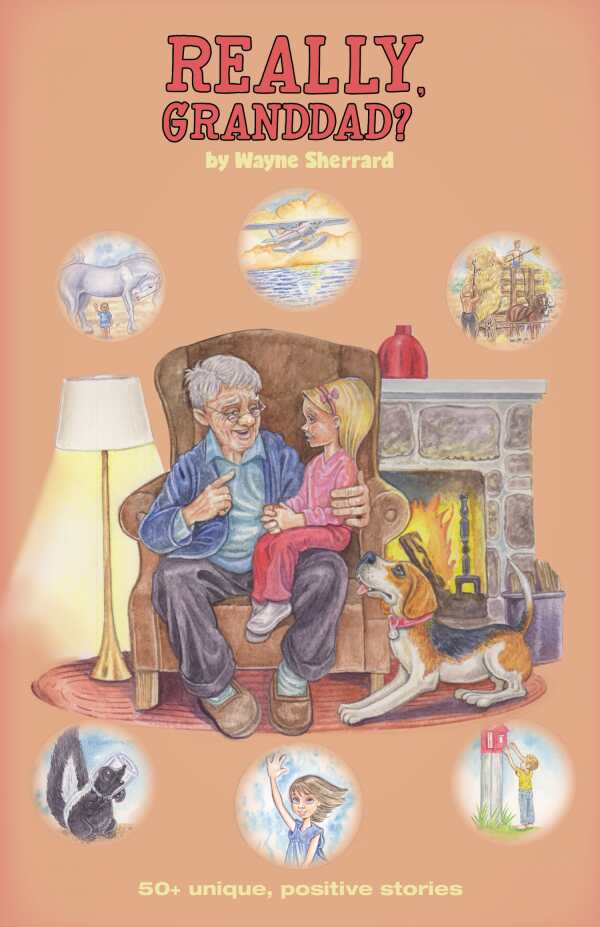Really, Granddad?
Really, Granddad? is a heartfelt memoir that strains insights from personal experiences.
Wayne Sherrard’s Really Granddad? assembles the Canadian grandfather’s personal, lighthearted anecdotes together with the aim of passing wisdom on to his granddaughter.
Inspired by the recurring plea of his grandchild to tell another story, Sherrard’s book collects his indelible childhood memories, shared in brief for the avowed purpose of appealing to short attention spans. These memories are from the 1950s to the 1970s; they are joyful, nostalgic, and full of advice, their tones sincere and their desire to be educational palpable.
Born into a military family, Sherrard amassed notable experiences as his family moved between Canada and Europe. Stories about sledding, trying escargot for the first time in France, and training a recalcitrant beagle are included. However, the anecdotes are organized in a haphazard way: a heartbreaking account of Sherrard’s parents’ deaths is followed by an incongruous chapter about April Fool’s Day pranks.
Consistency in voice holds the meandering episodic structure together. The writing is conversational with an air of gentle bemusement and fondness for the past. The book is partial to a dad joke sense of humor that leans into corniness, such as how the granddaughter doesn’t have to broaden her palate to include escargot right away, but can do so at a snail’s pace.
Those around Sherrard, especially his parents, are developed well; their personalities come through. His nurse mother is rendered as a compassionate, intuitive instructor with a sixth sense for when he was about to get into trouble. His father is preserved as strong, resourceful, and calm under pressure. Judicious details, as of Sherrard’s dairy-farming uncle calling his dog Rover his “right-hand man,” sketch evocative pictures of supporting characters in a few deft strokes.
Sherrard’s youthful escapades are made to translate into larger messages, such as about the importance of developing a positive attitude. A story about how a poor barefoot French girl smiled and waved to passing traffic every day teaches a lesson about how optimism infects others with a positive attitude. A tale about Sherrard’s determined grandmother helping him overcome a learning disability illustrates the value of persistence. Lively and dramatic storytelling enlivens mundane occurrences, like having a flight rerouted because of a snowstorm, which becomes an epic incident with an uncertain outcome.
Some of the book’s points are obvious; it asserts, for example, that it is ill-advised to stick your tongue to a cold surface, that staying away from skunks is best, and that openness to trying new foods is a good thing. Words like “real” and “not” are shared in bold print for emphasis, but the stylistic addition is unnecessary, and morals are tacked on to already straightforward work.
Artful hand-drawn illustrations of dogs, children, and idyllic childhood settings accompany the text, while photographs of Sherrard’s family add a visual frame of reference. The whimsical drawings, including the small recurring sketch of a beagle that is used to end most chapters, convey a homey folksiness.
In place of a resolution, the book ends with a list of ideas for a good life composed of familiar platitudes and a postscript image of Sherrard’s granddaughter running off to soccer practice; the scene is more perfunctory than poignant, serving as a bookend to complete the narrative conceit, instead of bringing the book to a satisfying end.
Really, Granddad? is a heartfelt memoir that strains insights from personal experiences.
Reviewed by
Joseph S. Pete
Disclosure: This article is not an endorsement, but a review. The publisher of this book provided free copies of the book and paid a small fee to have their book reviewed by a professional reviewer. Foreword Reviews and Clarion Reviews make no guarantee that the publisher will receive a positive review. Foreword Magazine, Inc. is disclosing this in accordance with the Federal Trade Commission’s 16 CFR, Part 255.

